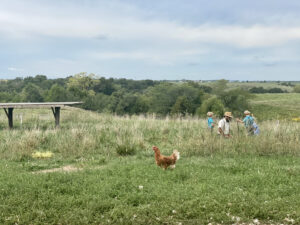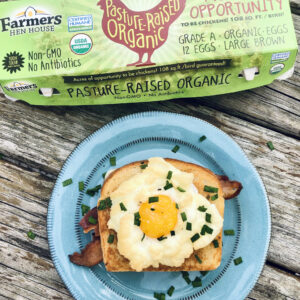Have you ever wondered about what makes pasture-raised eggs “pasture-raised“? Sometimes labels like “pasture-raised” can seem like a marketing gimmick. The truth is in part, they are. However, be encouraged that in terms of egg labels, there is oversight so that terms like “pasture-raised” are indeed held to a standard definition. We thought we provide a brief Top 5 for facts about pasture-raised eggs so that you can easily understand what makes them “pasture-raised.”

Top 5 Facts About Pasture-Raised Eggs
1. Provide at least 108 square feet per chicken.
- The outdoor space provided for each hen gives them every opportunity to spread their wings, forage for bugs, dust bathe, and to put it simply, be a chicken!
2. Hens have daily access to the pasture for six hours a day, weather permitting.
- Having access to significant time outdoors is important for chickens to live a healthy lifestyle both physically and emotionally.
3. Hens have access to bushes, trees and/or structures for shade and shelter from predators.
- Being able to take shelter outdoors is critical to a chicken’s sense of well-being and security. Given that chickens tend to be towards the bottom of the food chain, having easy access to trees and shelters gives them the peace of mind needed for them to thoroughly enjoy the outdoors.
4. Egg Yolks tend to be darker due to the varied diet (e.g. bugs, flowers) provided by the ability to forage outdoors.
- The various components and supplements found in bugs, flowers, and other wild plants diversify the chickens’ diet and therefore can help make for richer and darker egg yolks.
5. Price at the shelf tends to be higher due to the care and increased outdoor space provided the hens.
- It’s not necessarily surprising that pasture-raised eggs cost more on the self given the significant amount of outdoor space provided each hen. You can expect to see anywhere from a $1.00 – $2.00 increase over other cage-free and free-range eggs.
While pasture-raised eggs might cost more on the shelf, the quality of eggs your getting far outweighs its cost, and provides you with the peace of mind that you’re eating eggs that not only taste good, but do good for you and the hens!


